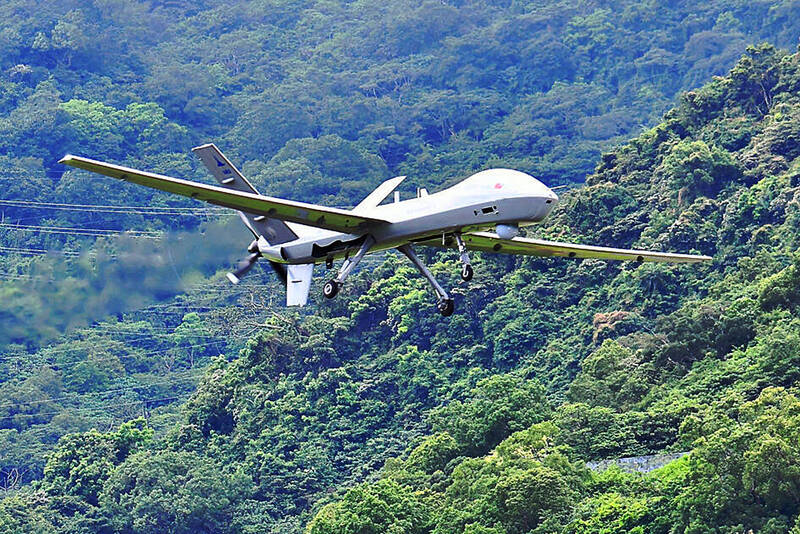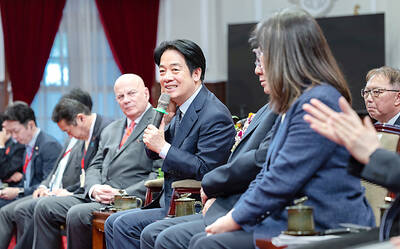The Ministry of National Defense plans to use a proposed aerospace and uncrewed aerial vehicle (UAV) industry campus to produce military drones, a defense official said yesterday.
The campus in Chiayi County’s Minsyong Township (民雄) would receive nearly NT$6.9 billion (US$216.12 million) to build factories, hangars and UAV testing facilities, the ministry’s budget proposal submitted last month to the Legislative Yuan showed.
The Chungshan Institute of Science and Technology, the ministry’s research and development arm, is to oversee the project, it said.

Photo: Yu Tai-lang, Taipei Times
Speaking on condition of anonymity, the defense official said the information disclosed by the report suggested that the campus would serve as the production center for drones, the military value of which has rapidly increased in the past few years.
The Teng Yun 2 (騰雲二型, “Cloud Rider 2”) and the Albatross II (銳鳶二型), the nation’s domestically developed medium-altitude long-endurance military drones, have passed operational tests, the official said, adding that the Teng Yun 2 last month participated in a live-fire precision-guided munition exercise.
The Albatross II reportedly performed well in the drills, although the armed forces have yet to issue a contract for mass production of the drone, they said.
The Chien Hsiang (劍翔, “Rising Sword”), a loitering munitions drone that targets radar systems, is believed to be slated for mass production next year, and would be funded through the regular budgetary process rather than the Sea-Air Combat Power Improvement Plan, they said.
The navy has also proposed a budget for the Hung Chueh 3 (紅雀三型, “Cardinal 3”) project to address flaws with its predecessor, the Hung Chueh 2 (紅雀二型), such as a lack of target designation capabilities, training simulators and dedicated trainer drones, the official said.
The Executive Yuan approved the drone budgets one day after approving a high-profile warship and submarine budget, which shows the urgency and importance that it has placed on improving the capabilities of the military’s UAVs, they said.
In May, the Cabinet approved the Five Trusted Industry Sectors development plan targeting chips, artificial intelligence, defense, security and surveillance, and next-generation communications.
The plan’s defense component includes funds to boost the nation’s UAV design and production capabilities with an emphasis on establishing supply chains outside of China, it said at the time.
The Executive Yuan’s 2028 targets for the drone industry include increasing the sector’s value 10-fold to NT$30 billion and a surge production capability of 15,000 systems a month.

Two US House of Representatives committees yesterday condemned China’s attempt to orchestrate a crash involving Vice President Hsiao Bi-khim’s (蕭美琴) car when she visited the Czech Republic last year as vice president-elect. Czech local media in March last year reported that a Chinese diplomat had run a red light while following Hsiao’s car from the airport, and Czech intelligence last week told local media that Chinese diplomats and agents had also planned to stage a demonstrative car collision. Hsiao on Saturday shared a Reuters news report on the incident through her account on social media platform X and wrote: “I

‘BUILDING PARTNERSHIPS’: The US military’s aim is to continue to make any potential Chinese invasion more difficult than it already is, US General Ronald Clark said The likelihood of China invading Taiwan without contest is “very, very small” because the Taiwan Strait is under constant surveillance by multiple countries, a US general has said. General Ronald Clark, commanding officer of US Army Pacific (USARPAC), the US Army’s largest service component command, made the remarks during a dialogue hosted on Friday by Washington-based think tank the Center for Strategic and International Studies. Asked by the event host what the Chinese military has learned from its US counterpart over the years, Clark said that the first lesson is that the skill and will of US service members are “unmatched.” The second

STANDING TOGETHER: Amid China’s increasingly aggressive activities, nations must join forces in detecting and dealing with incursions, a Taiwanese official said Two senior Philippine officials and one former official yesterday attended the Taiwan International Ocean Forum in Taipei, the first high-level visit since the Philippines in April lifted a ban on such travel to Taiwan. The Ocean Affairs Council hosted the two-day event at the National Taiwan University Hospital International Convention Center. Philippine Navy spokesman Rear Admiral Roy Vincent Trinidad, Coast Guard spokesman Grand Commodore Jay Tarriela and former Philippine Presidential Communications Office assistant secretary Michel del Rosario participated in the forum. More than 100 officials, experts and entrepreneurs from 15 nations participated in the forum, which included discussions on countering China’s hybrid warfare

MORE DEMOCRACY: The only solution to Taiwan’s current democratic issues involves more democracy, including Constitutional Court rulings and citizens exercising their civil rights , Lai said The People’s Republic of China (PRC) is not the “motherland” of the Republic of China (ROC) and has never owned Taiwan, President William Lai (賴清德) said yesterday. The speech was the third in a series of 10 that Lai is scheduled to deliver across Taiwan. Taiwan is facing external threats from China, Lai said at a Lions Clubs International banquet in Hsinchu. For example, on June 21 the army detected 12 Chinese aircraft, eight of which entered Taiwanese waters, as well as six Chinese warships that remained in the waters around Taiwan, he said. Beyond military and political intimidation, Taiwan